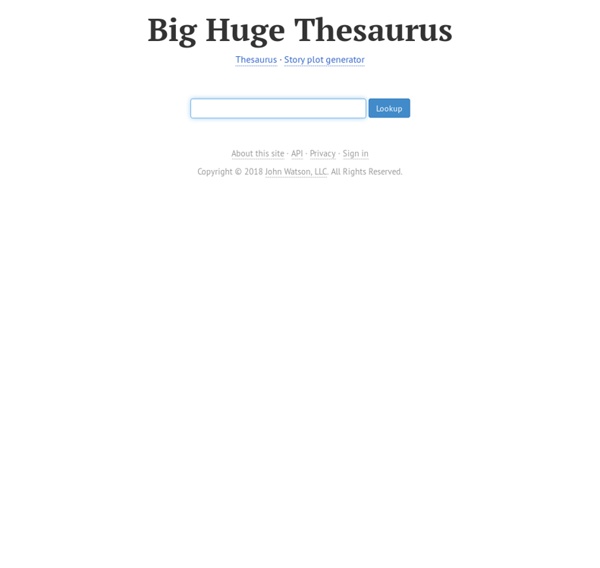



Reverse Dictionary and Thesaurus <div id="needs_javascript"><center><b>Note: The new Reverse Dictionary requires JavaScript.</b><br /><img src="/img/a.gif?q=omg_a_user_without_js"> If you have disabled JavaScript in your browser, please <a href=" it for this site</a> or use the <a href="/?w=entersearchhere&loc=revfp_legacy">old version of the reverse dictionary</a> here.</p><p></center><div> How do I use OneLook's thesaurus / reverse dictionary feature? The Bookshelf Muse: The coffee on the desk is cold. The doorbell’s ringing. Your dog is making those frantic whimpers meaning ‘I want to go outside and maybe pee on something’ has escalated to ‘Another 10 seconds and you'll need a boat to get to the kitchen’. You are aware of these things, yet stay glued to your chair, your fingers flying across the keyboard.
How to Create a Powerful Antagonist: The Epic Villain Breakdown — She's Novel What are they? Mental Illness Track: Self Mental Illness is an umbrella term for any number of diseases your main character may have to face. The Ultimate Guide to Writing Better Than You Normally Do. Writing is a muscle. Smaller than a hamstring and slightly bigger than a bicep, and it needs to be exercised to get stronger. Think of your words as reps, your paragraphs as sets, your pages as daily workouts. Think of your laptop as a machine like the one at the gym where you open and close your inner thighs in front of everyone, exposing both your insecurities and your genitals. Because that is what writing is all about.
Ten rules for writing fiction Elmore Leonard: Using adverbs is a mortal sin 1 Never open a book with weather. If it's only to create atmosphere, and not a character's reaction to the weather, you don't want to go on too long. The reader is apt to leaf ahead looking for people. There are exceptions. If you happen to be Barry Lopez, who has more ways than an Eskimo to describe ice and snow in his book Arctic Dreams, you can do all the weather reporting you want.
OWL Coming Soon: A new look for our same great content! We're working hard this summer on a redesign of the Purdue OWL. Worry not! An Illustrated Guide to Writing Scenes and Stories The writing workshop/lecture Wonderbook: Scenes is an edited version, using as its starting point the transcript of a version presented at the Arkansas Book Festival in 2014. Both before that event and after, I gave versions of this lecture in other locations, including Shared Worlds, Clarion, and the Yale Writer’s Workshop. While keeping the core of the Arkansas version, I have added in material from the other versions and also expanded some sections based on participant questions.
50 Free Resources That Will Improve Your Writing Skills Advertisement Today, too many websites are still inaccessible. In our new book Inclusive Design Patterns, we explore how to craft flexible front-end design patterns and make future-proof and accessible interfaces without extra effort. Hardcover, 312 pages. Get the book now! Effective writing skills are to a writer what petrol is to a car. Grammar Girl Mignon Fogarty is the creator of Grammar Girl and the founder and managing director of Quick and Dirty Tips. A magazine writer, technical writer, and entrepreneur, she has served as a senior editor and producer at a number of health and science web sites. She has a B.A. in English from the University of Washington in Seattle and an M.S. in biology from Stanford University.